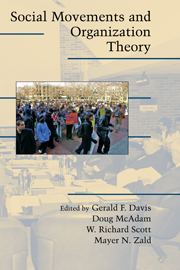II - Political and Mobilization Context
Published online by Cambridge University Press: 05 September 2012
Summary
The essays in this section have a common theme: the developmental dependence of both movements and organizations on the mobilization and political contexts in which they develop. By political context we mean variability in both the formal legal/institutional structuring of politics and the shifting informal elite alignments that define a given historical period. Mobilization context refers more to the social demographic bases of local populations. The chapters in this section exhibit similarities and differences. Three use statistical analyses to show how differences in political and mobilization contexts across all fifty states lead to differences in outcomes. All of the chapters can be seen as doing a kind of political sociology of the phenomena they are studying. But the chapters are also different in the concepts they use, in the extent to which events and processes at the national level are seen as interacting with state-level phenomena, and in the historical depth explored by the analysis.
In Chapter 3, “Institutional Variation in the Evolution of Social Movements: Competing Logics and the Spread of Recycling Advocacy Groups,” Michael Lounsbury studies one aspect of the modern environmental movement as it penetrates organizations and local communities. His chapter draws upon the concept of institutional logics and on concepts related to mobilization context. Specifically, he shows that the formation of early state recycling advocacy groups was enabled by state-level conditions that were favorable to ecological activism.
- Type
- Chapter
- Information
- Social Movements and Organization Theory , pp. 69 - 72Publisher: Cambridge University PressPrint publication year: 2005



